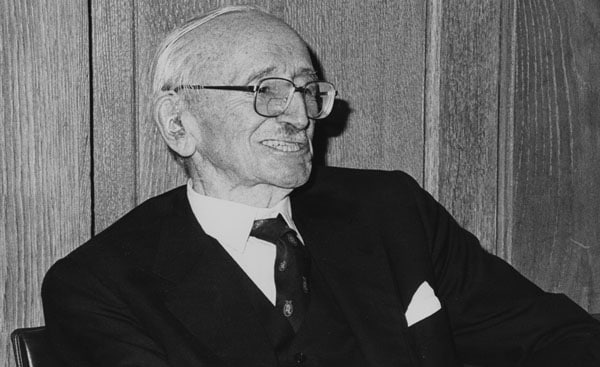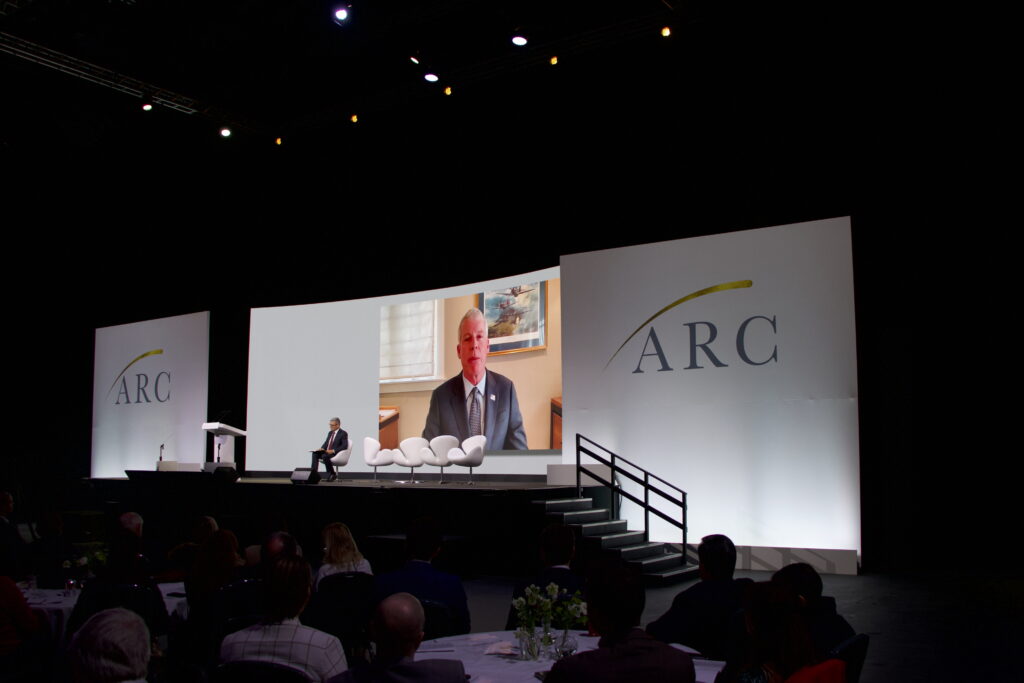Margaret Thatcher’s intellectual love affair with the economist Friedrich von Hayek continued despite divergent views on the importance of science, rationality and truth…
Margaret Thatcher presented a clear argument before the Royal Society in 1988: The free market economy depended on a sustainable natural ecology. And science provided the necessary knowledge to guide the industry on what would, in fact, be sustainable.
The then-Prime Minister’s argument was based on reason. It was rational to expect her fellow free market ideologues to agree with her simple premise. But it seemed Thatcher’s adherence to science, distilled during her time studying chemistry at Cambridge, was not shared by her philosophical allies.
Friedrich von Hayek, her intellectual mentor, published a truly peculiar book in the same year as Thatcher’s Royal Society speech that attacked the very foundations of intellectual endeavour, reason, science and basic facts, deeming them to be the very enemies of tradition and morality.
Hayek was no longer a professional economist by 1988, at which point he published The Fatal Conceit: The Errors of Socialism with the free market-dominated Chicago University.
“I did only incidental work in economics,” he admitted, while his friend and ally, Milton Freidman, confirmed that “the truth of the matter is, he really got out of that side of the business.”
But he was still paranoid about socialism: “The higher we climb up the ladder of intelligence, the more we talk with intellectuals, the more likely we are to encounter socialist convictions,” he wrote.
“Rationalism, empiricism, positivism, and utilitarianism. In such definitions one finds quite explicitly… the declaration of faith of modern science and the philosophy of science, and their declarations of war against moral traditions.
Socialism as a ruse
“These declarations, definitions, and postulates have created the impression that only that which is rationally justifiable, only that which is provable by observational experiment, only that which can be experienced, only that which can be surveyed, deserves belief; that only that which is pleasurable should be acted upon, and that all else must be repudiated… and that our task must be to construct a new morality on the basis of scientific knowledge—usually the new morality of socialism.”
Much of his anger appears to have been a reaction against claims that his free market ideology was nothing but a ruse to fool workers into supporting capitalism.
He complained that his work had been “challenged, even ridiculed, as the selfish excuse of privileged classes”. Hayek returned to his argument, expressed in The Road to Serfdom, that no system could satisfy the multitude desires of the masses.
To support this claim, he seemed to be saying that “facts” themselves did not exist. “Some hypothetical body of objective fact is no more available to capitalists for manipulating than it is to the managers that socialist would like to replace them. Such objective facts simply do not exist and are unavailable to anyone.”
Hayek’s argument appears to be deeply pessimistic here, viewing the world and his fellow human beings as hostile and irrational. People should not expect to get what they want, and should be happy only to have the chance to reproduce.
Social Darwinism
He argued that capitalism might not be pleasant, or fair, or valid, but that it was necessary. “Our civilisation depends, not only for its origin but also for its preservation, on what can be precisely described only as the extended order of human cooperation, an order more commonly, if somewhat misleadingly, known as capitalism.”
Civilisation “resulted not from human design or intention but from spontaneity it arose from unintentionally conforming to certain traditional and largely moral practices, many of which men tend to dislike, whose significance they usually fail to understand, whose validity they cannot prove…”.
According to Hayek’s world view, “our desires and wishes are largely irrelevant” and only the continuation of human existence is important. “We can against calamity—strive after what, under favourable conditions, will continue to lead, at least for some time, and in many places, to further increases.”
Perhaps this is what followers of the free market mean when they say humanity will be able to adapt to climate change. The Fatal Conceit appears to have demonstrated something John Maynard Keynes had observed more than 40 years earlier: that Hayek was wrestling with his own conscience and losing.
One interpretation of this book is that Hayek himself believed in his heart that rationalism, empiricism and the rationally justifiable led irresistibly to socialism. He must have been grateful that the Soviet Union offered only totalitarianism and despair while “the outlook for communism, which is both anti-property and anti-family (and also anti-religion), is not promising”.
Societies have evolved, he went on to suggest, through a form of community-wide natural selection. This “social Darwinism” would have dark echoes of Nazism with its faith in the superior Aryan race.
The apparent chasm between Thatcher’s scientific rationalism and Hayek’s unprovable traditionalism did not, however, affect their friendship.
The prime minister would congratulate the economist on the occasion of his 90th birthday in May 1989. “It is 10 years this week since I was privileged to become prime minister,” she wrote.
“None of it would have been possible without the values and beliefs to set us on the right road and provide the right sense of direction. The leadership and inspiration that your work and thinking gave us were absolutely crucial, and we owe you a great debt.”
Next week: Bert Bolin and the founding of the IPCC, attracting staunch opposition from the energy industry with the creation of the Global Climate Coalition, a corporate powerhouse designed to undermine any global effort to prevent climate change.
Subscribe to our newsletter
Stay up to date with DeSmog news and alerts







